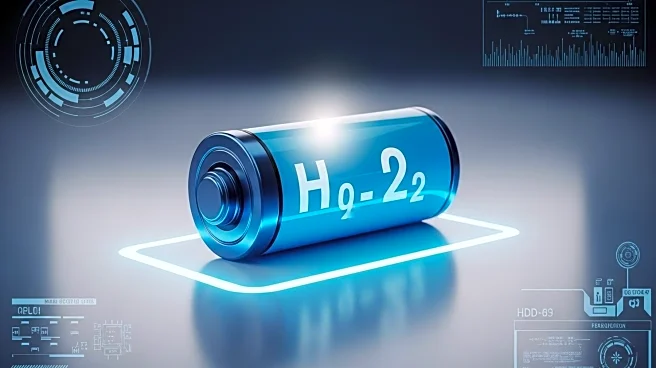What is the story about?
What's Happening?
Researchers at Tokyo's Institute of Science have developed a hydrogen battery that operates at significantly lower temperatures than previous models, potentially revolutionizing energy storage for electric vehicles. The new battery uses magnesium hydride as the anode and hydrogen gas as the cathode, with a solid-state electrolyte featuring a crystal structure. This innovation allows the battery to function at 194 degrees Fahrenheit, compared to the 572-752 degrees Fahrenheit required by current hydrogen storage methods. The battery achieves full theoretical storage capacity and high ionic conductivity at room temperature, offering a promising alternative to lithium-ion batteries, which are heavier and degrade over time.
Why It's Important?
This breakthrough in hydrogen battery technology could significantly impact the electric vehicle industry by providing a more efficient and sustainable energy storage solution. Hydrogen batteries offer a lower carbon footprint compared to fossil fuels and current hydrogen-based systems, potentially accelerating the transition to green energy. If scaled up, this technology could replace lithium-ion batteries in electric vehicles, addressing issues such as weight and efficiency degradation. The development aligns with global efforts to reduce reliance on fossil fuels and promote cleaner energy sources.
What's Next?
The next steps involve scaling up the production of these hydrogen batteries and integrating them into electric vehicles. Researchers and manufacturers will need to address challenges related to production costs and infrastructure for hydrogen storage and distribution. The successful implementation of this technology could lead to widespread adoption in the automotive industry, influencing policy decisions and investment in green energy solutions.
Beyond the Headlines
The development of hydrogen batteries also raises ethical and environmental considerations, such as the sourcing of materials and the impact on ecosystems. Long-term shifts in energy production and consumption patterns could emerge, influencing global energy markets and geopolitical dynamics. The technology may also drive innovation in other sectors, such as renewable energy and industrial applications.















